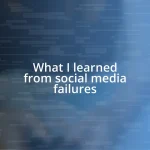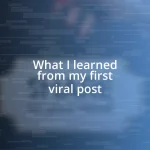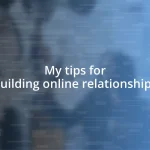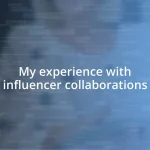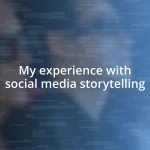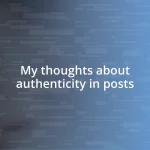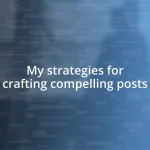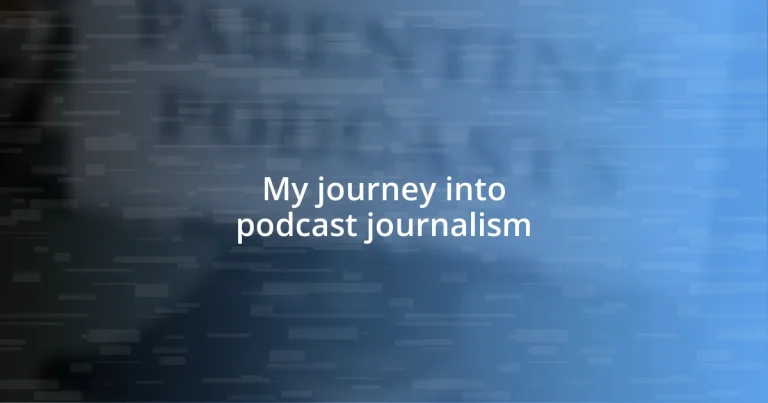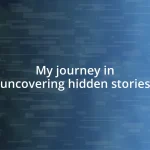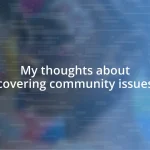Key takeaways:
- Podcast journalism fosters deep emotional connections through personal storytelling and relatable content, creating a sense of community among listeners.
- Choosing a niche is crucial for developing authentic content that resonates with both the creator’s passions and the audience’s interests.
- Engaging with the audience through feedback, social media interaction, and monetization strategies enhances loyalty and connection, ultimately enriching the podcasting experience.
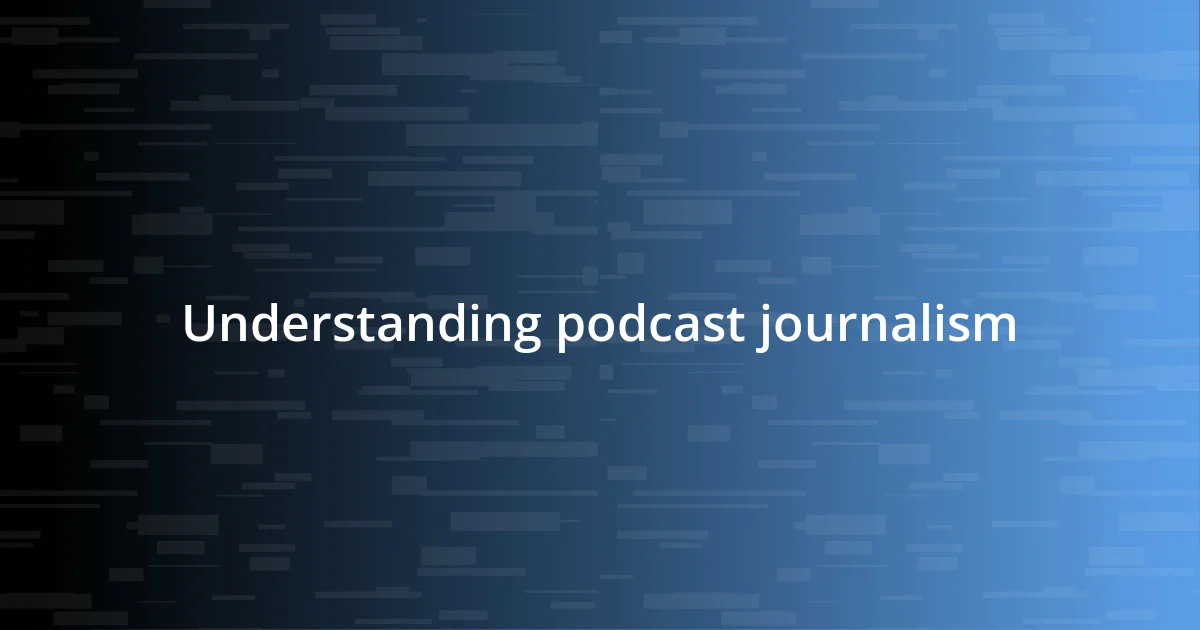
Understanding podcast journalism
Podcast journalism is a fascinating blend of storytelling and information-sharing, allowing us to delve into topics with both depth and accessibility. I vividly remember the first time I stumbled upon a podcast that changed my perspective on a complex social issue; it felt like having an intimate conversation with an expert over coffee. Isn’t it amazing how voices can convey passion and insight in a way that text sometimes can’t?
At its core, podcast journalism thrives on authenticity and relatability. The personal anecdotes shared by hosts often resonate deeply, creating an emotional connection with listeners. I still feel a spark of inspiration when I think about a host who bared their soul while recounting their struggles; it made me reflect on my own challenges and realize that I wasn’t alone in my journey.
The unique format of podcasts also allows for a more casual dialogue, breaking down barriers between journalists and their audience. Have you ever found yourself nodding along, agreeing with a point made about a current event? I’ve experienced that countless times, feeling engaged and part of a larger conversation. This interactive aspect helps foster a community of listeners who are eager to explore and discuss the world around them.
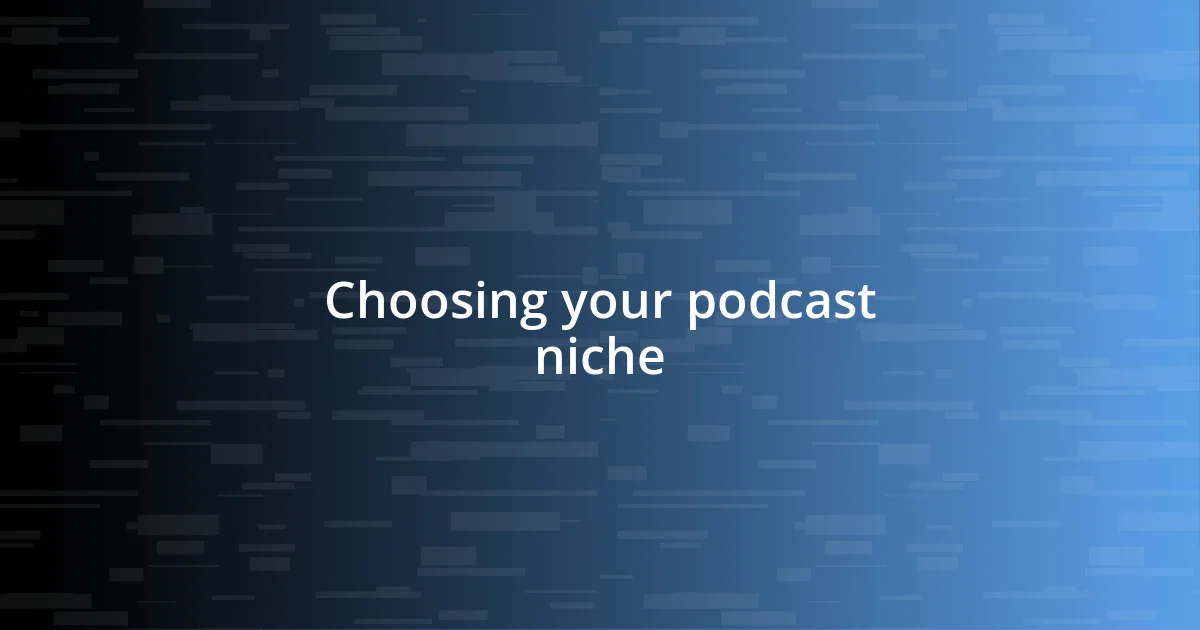
Choosing your podcast niche
When I was selecting my podcast niche, I felt a mix of excitement and uncertainty. I’d always been passionate about social issues, but which specific aspect should I focus on? After weeks of brainstorming, I realized that the stories of marginalized communities were deeply ingrained in my experience, and that became my focal point. Carving out that niche not only provided direction but also ignited a fire within me to amplify voices that often go unheard.
Identifying the right niche is fundamental; it shapes your content and attracts your audience. I remember grappling with the question: “What do I truly want to share?” Once I discovered my niche, every episode began to feel like a genuine reflection of my journey—my struggles, my insights, and most importantly, my passions. Niche selection isn’t just about standing out; it’s about creating an authentic conversation that resonates with both you and your listeners.
In the end, the journey of choosing a niche is deeply personal. My experience taught me that it’s essential to not only think about what interests you but also to consider what might connect with your audience. I’ve found that when you base your podcast on your authentic self, it becomes easier to develop compelling content that invites engagement and fosters a loyal community.
| Niche Aspect | Emotional Connection |
|---|---|
| Social Issues | Resonates with shared struggles and drives social awareness |
| Personal Stories | Fosters empathy, creating a deeper bond with the audience |
| Community Voices | Empowers underrepresented narratives, encouraging collective dialogue |
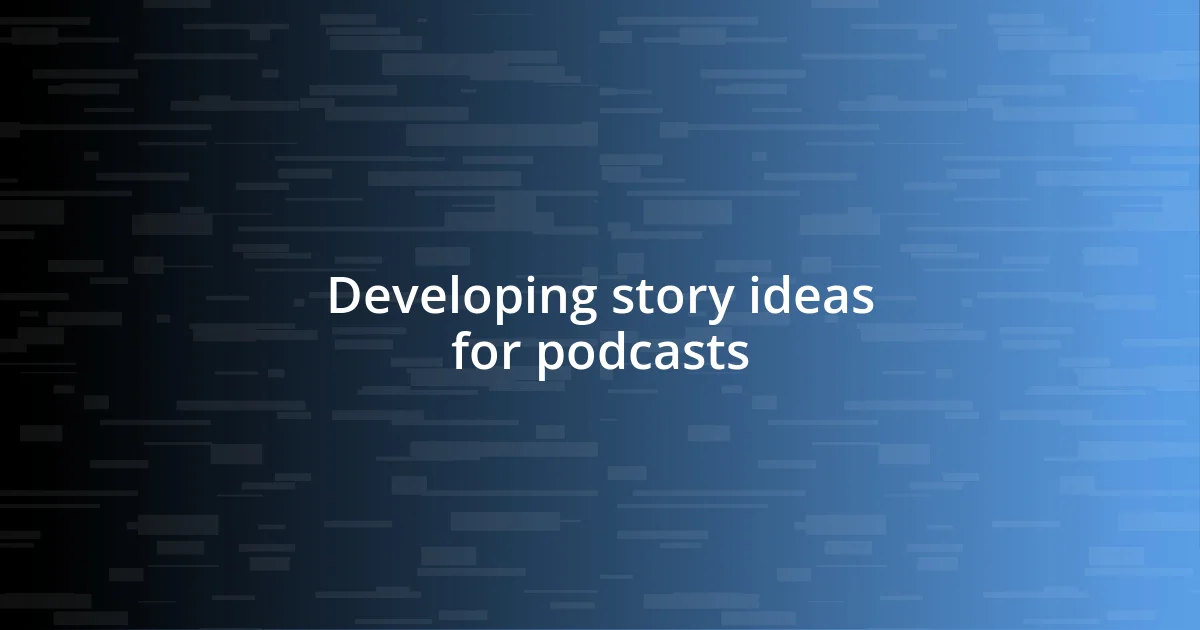
Developing story ideas for podcasts
Developing story ideas for podcasts can feel like embarking on a treasure hunt; you never quite know what you’ll unearth. I often find inspiration in the world around me. One day, while walking through my neighborhood, I overheard a heartwarming conversation between a father and his young daughter about their favorite local ice cream shop. This simple moment sparked an entire episode, exploring the nostalgia and community impact of local businesses. It’s fascinating how everyday experiences can lead to compelling stories that resonate with listeners.
To generate story ideas, consider a mix of the following approaches:
- Personal Experiences: Reflecting on your own life can reveal unique insights and connections.
- Current Events: Staying informed about trending topics can help shape timely and relevant discussions.
- Audience Feedback: Engaging with your listeners can uncover their interests and questions.
- Interviews: Talking to diverse individuals can provide fresh perspectives and new angles.
- Cultural Moments: Pop culture trends or events can be avenues for exploration and commentary.
These methods are invaluable in crafting captivating narratives that engage your audience. I remember how the audience’s excitement about a particular subject helped steer my content in unexpected but rewarding directions. By remaining open to inspiration, my podcast evolved into a rich tapestry of ideas and stories that not only reflected my journey but also resonated deeply with those who listened.
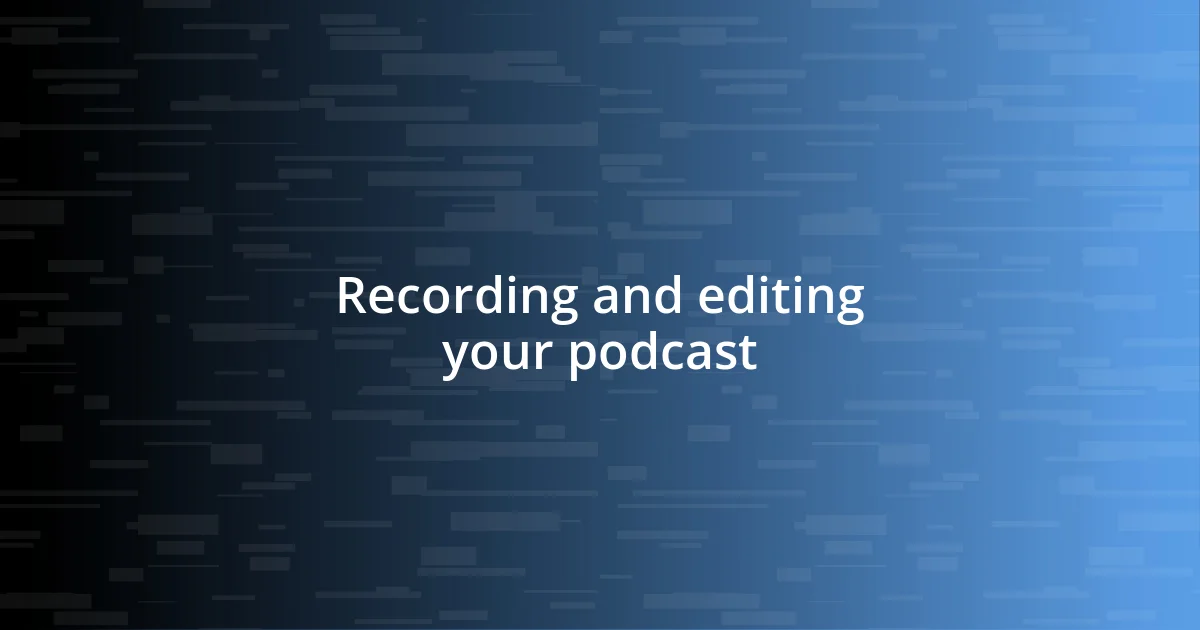
Recording and editing your podcast
Recording your podcast is one of the most thrilling parts of the journey, but I’ve learned it can also feel a bit daunting. I still remember my first recording session—my heart was pounding, and I wasn’t sure if my voice sounded right. Choosing the right equipment made a huge difference, though—investing in a quality microphone can really elevate your sound. I’ve found that creating a comfortable atmosphere helps me relax, allowing my true voice to shine through.
Editing, on the other hand, is where the magic happens. The first time I sat down to edit, I had an overwhelming mixture of excitement and fear. It felt like sculpting from a block of marble; every cut and adjustment could refine the story. I quickly discovered that simple editing software can be incredibly user-friendly. I remember trimming out filler words and pauses not only helped tighten the narrative but also made it sound more professional. But it’s important to balance technical skill with maintaining the authenticity of the conversation—I make sure to keep the genuine moments that really resonate with listeners.
What I’ve realized throughout this journey is that recording and editing are not just technical processes; they’re opportunities to express your voice and connect with your audience. Each episode is a reflection of my thoughts and experiences. As I edit, I often ask myself, “Does this piece truly convey the essence of what I want to share?” It’s a rewarding process that, when done well, leaves everyone feeling like they’ve just shared a moment with an old friend.
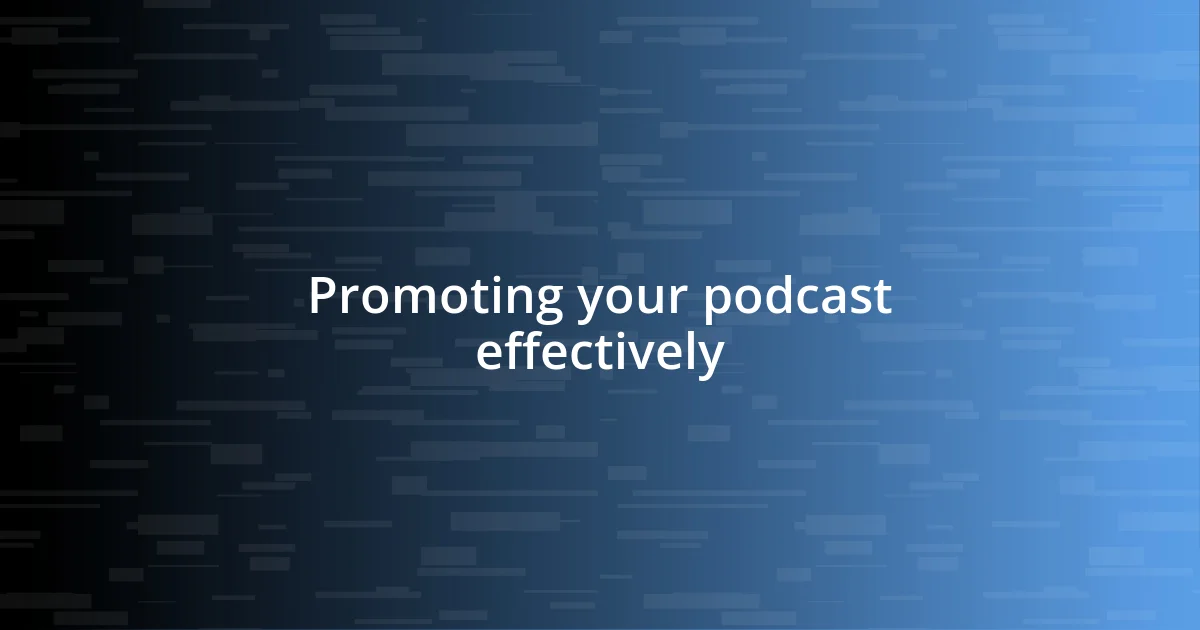
Promoting your podcast effectively
Promoting your podcast effectively can feel like navigating a busy marketplace; the key is to stand out amid the noise. I remember when I first launched my podcast and struggled with visibility. After experimenting with social media platforms, I discovered that creating engaging teasers—like short clips from my episodes—greatly improved my reach and listener engagement. It’s fascinating how a snippet of an interesting discussion can spark curiosity and encourage shares among friends.
Collaborating with other podcasters and influencers has also been a game changer for me. One time, I reached out to a fellow podcaster whose audience aligned with mine. Together, we hosted a live Q&A session. The response was overwhelming! It not only brought new listeners to my show, but it also allowed me to form connections with others in the podcasting community. Have you considered how partnerships could enhance your podcast’s visibility? Sharing audiences can truly amplify your message.
Email newsletters have proven invaluable too. I discovered that crafting a personal message to my listeners about upcoming episodes, complete with behind-the-scenes insights, makes them feel like part of my journey. I’ve learned that listeners appreciate being in the loop; it deepens their connection to the content. By engaging them directly, I transform casual listeners into loyal fans eager to support and promote my work. What strategies are you considering to keep your audience engaged? Reflecting on this could open new doors to reaching potential listeners.
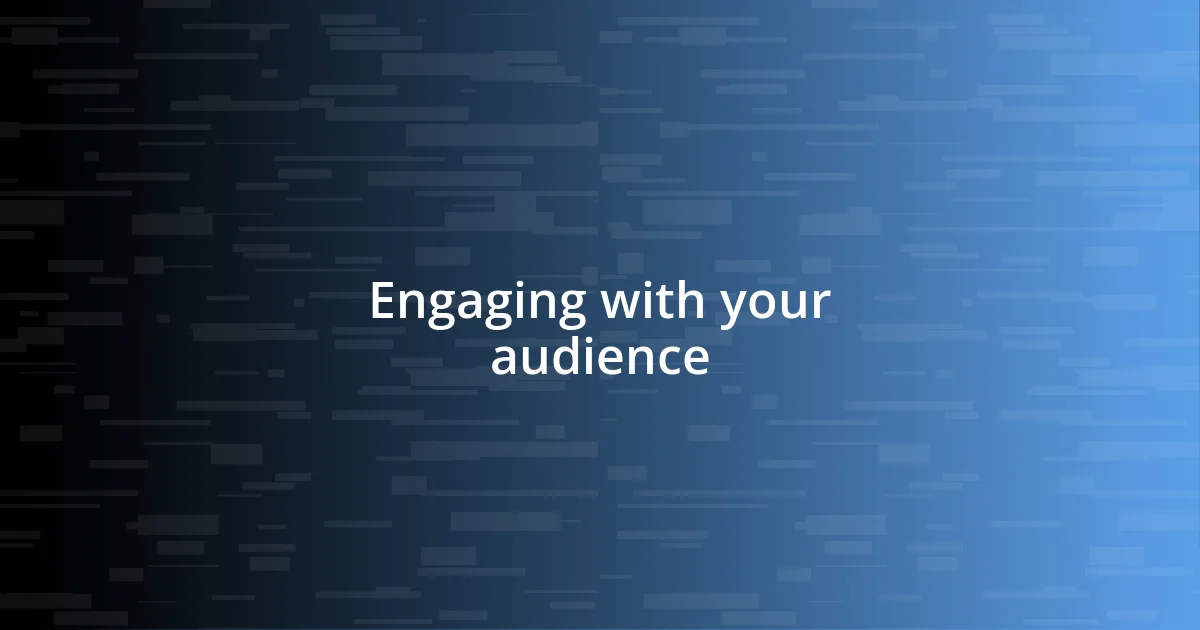
Engaging with your audience
Engaging with your audience is where the real connection happens. I vividly recall a listener sharing how one of my episodes resonated with them during a challenging time. That moment really struck me; I realized my voice could offer comfort and understanding to someone I would never meet. Have you ever considered the power of your words and how they can uplift others? For me, this insight fuels my desire to create content that speaks to my audience’s experiences.
Listeners appreciate when they feel heard and valued. After launching a social media poll to ask my audience what topics they wanted me to cover, I was blown away by their enthusiasm. Seeing their suggestions translates into tailored content that directly resonates with their interests. It fosters a sense of community, making the listeners feel like they own a part of the narrative. I believe striking this balance between sharing my perspective and prioritizing their preferences can lead to a more fulfilling podcasting journey.
I also make it a point to respond to comments and engage in discussions online. Last year, I took extra time to connect personally with those who reached out, and it enriched my understanding of their needs. The vulnerability shown in these exchanges often leads to raw, real content that reflects life as it is. How often do we get to peel back the layers and discuss genuine feelings? This practice of dialogue not only bolsters my confidence but also creates a trusting relationship with my audience. Embracing this dynamic interaction allows us to share smiles, support, and stories together.
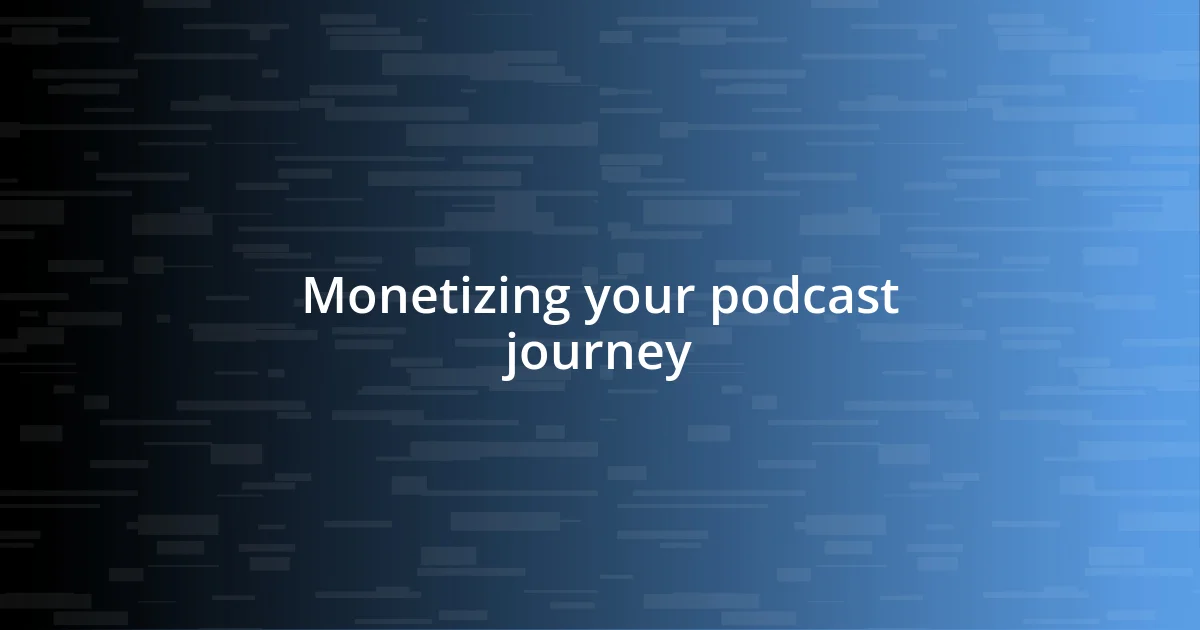
Monetizing your podcast journey
Monetizing your podcast journey involves creativity and a willingness to explore various revenue streams. Early on in my podcasting career, I decided to try crowdfunding through platforms like Patreon. It was a little intimidating at first, but I soon discovered that my most loyal listeners appreciated the opportunity to support my work directly. Have you thought about how your audience might want to invest in the content they love? Their contributions not only provided financial support but also fostered a deeper connection to my podcast.
Sponsorships are another avenue worth considering. When I first reached out to potential sponsors, I was surprised by how many were willing to collaborate! I tailored my pitch to show how aligning with my podcast would benefit their brand. By sharing listener demographics and engagement insights, I demonstrated the value my platform could offer. This approach led to fruitful partnerships—have you identified brands that resonate with your content?
Merchandising has also been a delightful addition to my podcast journey. After I released branded T-shirts featuring clever catchphrases from my episodes, I was amazed at the enthusiastic response. It became more than just a revenue stream; it turned my listeners into walking ambassadors for my show! Seeing someone wear a shirt with a saying I coined filled me with pride—has anyone ever worn something related to your content in public? It’s these little moments that remind me of the impact we can have beyond the microphone.




